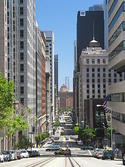It may be en vogue among a certain group to express concern about the influence of Russian oligarchs within our political system, but perhaps we should all be a bit more concerned about the home-grown variety, the Silicon Valley and tech billionaires. Given their huge wealth, influence and control over information, we need to start having serious discussions about how best to deal with their impact on our democracy, which they increasingly seem to want to co-opt with their money and power. read more »
Silicon Valley
A Corporate Wealth Tax: Making the Oligarchs Pay
- Login to post comments
Watch Out! Here Come the ‘Woke’ Tech Oligarchs
Once the rich protected themselves by aligning with Republicans who would protect their property from high taxes and their firms from regulation.
Some still do—notably the Koch brothers—but this breed of right-winger is gradually losing out to more progressive tilted plutocrats. read more »
Is Mass Media Good or Bad For You and Your Family?
Since the internet, and particularly smartphones, became household commodities, mass media's impact on people and societies has increased exponentially.
As you might expect, there is a swinging pendulum of public opinion which often shifts from decrying the ills of this trend to extolling the many virtues of on demand technology. read more »
- Login to post comments
If the tech oligarchs can’t beat the bad press, they’ll just buy it
What’s an oligarch to do? The putative tech masters of the universe now face unprecedented criticism from both left and right. The reasons extend from wanton privacy invasions of the people once described by Facebook’s Mark Zuckerberg as “dumb f***ks” to President Trump’s typically hyperbolic assaults on Amazon’s success at tax avoidance. read more »
What the Census Numbers Tell Us
The most recent Census population estimates revealed something that the mainstream media would prefer to ignore—the slowing population growth of big cities, including New York. The New York Times, for example, trumpeted Gotham’s historically high population yet failed to mention that the city’s growth is not only dramatically slowing but also, in the case of Brooklyn, declining for the first time since 2006. read more »
- Login to post comments
How Silicon Valley Went From ‘Don’t Be Evil’ to Doing Evil
Meet the new boss. Same as the old boss.
– The Who, “We won’t be fooled again”, 1971
Once seen as the saviors of America’s economy, Silicon Valley is turning into something more of an emerging axis of evil. “Brain-hacking” tech companies such as Apple, Google, Facebook, Microsoft and Amazon, as one prominent tech investor puts it, have become so intrusive as to alarm critics on both right and left. read more »
- Login to post comments
From Disruption to Dystopia: Silicon Valley Envisions the City of the Future
The tech oligarchs who already dominate our culture and commerce, manipulate our moods, and shape the behaviors of our children while accumulating capital at a rate unprecedented in at least a century want to fashion our urban future in a way that dramatically extends the reach of read more »
In The New Year, Worry-Free California Has A Lot To Worry About
Propped up by media idolatry, California is moving from denial to delusion. Case in point: A recent AP story claimed that the state “flush with cash from an expanding economy” would consider spending an additional billion dollars on health care for the undocumented, as well as a raft of new subsidies for housing and the working poor. read more »
- Login to post comments
Big Tech Finds Itself Lacking Political Allies
Our nation’s ruling tech oligarchs may be geniuses in making money through software, but they are showing themselves to be not so adept in the less quantifiable world of politics. Once the toast of the political world, the ever more economically dominant tech elite now face growing political opposition, both domestically and around the world. read more »
- Login to post comments
High-Flying California Charts Its Own Path -- Is A Cliff Ahead?
As its economy bounced back from the Great Recession, California emerged as a progressive role model, with New York Times columnist Paul Krugman arguing that the state’s “success” was proof of the superiority of a high tax, high regulation economy. read more »
- Login to post comments






















